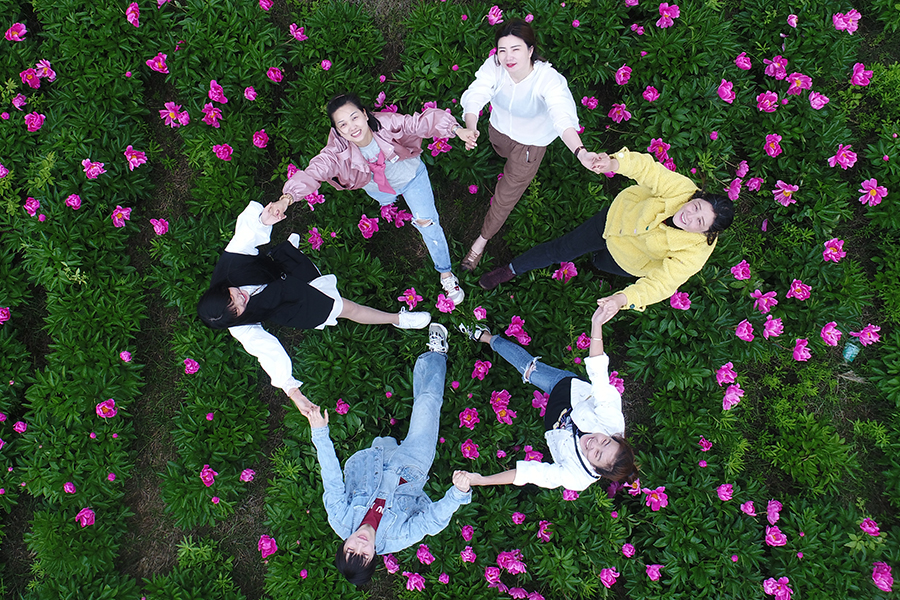Tourism sector pins hopes on May Day holiday
The tourism industry is placing its hopes on the upcoming May Day holiday, which runs from May 1 to 5, by offering big discounts, upgrading itineraries and making strenuous online marketing efforts.

A rose garden attracts visitors to Jiujiang, Jiangxi province, on April 19, 2020. [Photo/For China Daily]
"We hope to return to our daily visitor limit of about 2,000 a day for the Labor Day break. To prevent crowds forming, our staff members will guide tourists to different areas."
Fan Lu, marketing director for Lost Villa, a boutique bed-and-breakfast chain known for renovating ancient residences in traditional Chinese style, said: "We post scenes online of bamboo and rapeseed in flower to show visitors that the air is fresh and there are few people in the mountains. After about a month, occupancy rates at some of our establishments have returned to normal.
"Some of the boutique bed-and-breakfast establishments in rural areas have a good environment, offer cozy accommodation and are far away from crowds. They meet tourists' current demands. Our strategy is to maintain our original customers."
Located in beautiful countryside, the chain's establishments offer 15 to 24 guest rooms and are about a 30-minute drive from a scenic spot.
During a livestreaming session, the company sold more than 1,500 rooms at 888 yuan a night each, a discount of about 50 percent.
Xiao Zhiqiang, who runs a small road trip business in Chengdu, Sichuan province, livestreamed his 11-day trip with other travelers to Lhasa, Tibet autonomous region, on the tourism website Mafengwo.
"It's good to be on a journey again. The scenery is as beautiful as always, and the travel experience is better due to fewer crowds," he said on the broadcast.
"The pandemic has forced the service industry to do all it can to survive. Accommodation charges have been greatly reduced, and we have been treated well and have been provided with good service."
Xiao said travelers who want to visit Tibet should apply online for QR health codes. If they are from low-risk areas, they do not have to be quarantined, but must have their temperature checked.
He plans to livestream his road trips in Sichuan to boost his business. His broadcast in Tibet has fostered trust between him and online followers, some of whom want to join Xiao for a trip.
Since mid-February, Mafengwo-also a major online tour agency-has invited tourism operators and travel bloggers to make livestream programs. Such broadcasts during the Labor Day holiday will cover several hundred global destinations to meet demand among those who cannot visit these places in person.
Feng Rao, head of Mafengwo's tourism research center, said livestreaming is a major means of virtual travel-a key channel for the tourism business to communicate with potential customers.
"Clients take much longer to make a decision in the tourism industry than in other retail businesses. They like livestream broadcasts that provide an authentic feel and give them the sense of being in a particular place. They will make their travel decisions after watching good-quality livestreaming," he said.
Popular destinations
Xu Xiang, deputy general manager of the consumer operations department at Fliggy, Alibaba's travel service platform, said the favorite destinations among clients during the Qingming holiday have gained great popularity through livestreaming and other virtual travel activities.
"The industry cannot possibly wait until the pandemic is over. People have been attracted through virtual travel programs, and some businesses are distributing coupons during livestreaming sessions to attract potential customers," Xu said.
Fliggy recently offered more than 3,000 discounted travel products for popular domestic destinations, such as Shanghai, Hangzhou, capital of Zhejiang province, and Sanya, Hainan province.
Xu said: "The domestic tourism industry is recovering gradually. Many people are eager to take a tour, but are still worried about the pandemic. The rate of (the industry's) recovery is subject to progress in the global fight against COVID-19."
Zhan Dongmei, an associate research fellow at the China Tourism Academy, said: "Tourists should not relax their guard. They should look at the pandemic situation at their destination and avoid being in crowds, especially indoors."
She suggested that scenic areas adopt a policy for tourists to make online reservations in advance, to avoid too many arrivals at the same time. Visitors should also be aware of such a policy.

